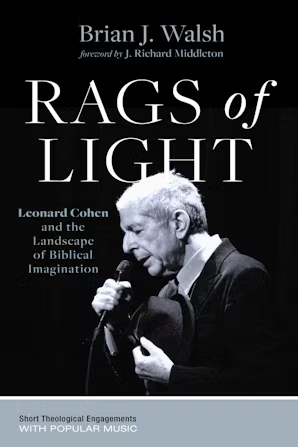Reading the Prophets with Leonard Cohen
Reading AudaciouslyBrian J. Walsh
Published 28 November 2024

The following selection, used by permission of Wipf and Stock Publishers (www.wipfandstock.com), is from Rags of Light: Leonard Cohen and the Landscape of Biblical Imagination, recently published by Cascade Books. In it, biblical scholar and pastor Brian Walsh of Bible Remixed creatively brings the lyrics and writings of Leonard Cohen into conversation with Scripture. Walsh explores how Leonard Cohen has been a liturgist for our time, a cantor singing for all those clothed in rags of light, a prophet in the ruins, and a priest who greets us “from the other side of sorrow and despair.” Click here for more information and to purchase.
THE PROPHET GOES TO WAR
If we were right in the last chapter arguing that for Cohen — and, indeed, within the biblical landscape itself — covenant goes all the way down and that covenant is the glue of all things, then I think we can suggest that where there is a breaking of covenant there will be conflict permeating all things. And Cohen seems to have been drawn to such conflict from an early age. A few years before his Montreal Jewish Public Library speech, Cohen wrote to his brother-in-law to explain his presence in the war zone of Cuba during the 1961 Bay of Pigs invasion. He placed the Cuba crisis in a larger and deeper context of war:
It is the war between those who conceive of
existence as a dynamic rainbow, and those who
conceive of it as a grey monotone, between
those who are willing to acknowledge the end-
less possibilities, agonies, delights, mysteries
and destinies of the human predicament, and
those who meet every human question with a
rigid set of answers, some immutable inheri-
tance from a father or a god or a revolution. This
is the old war, Athens against Sparta, Socrates
against Athens, Isaiah against the priests, the
war that deeply involves our “western civilization,”
the one to which I am committed.
There is a war, and it seems to go all the way down. While the priest might seek appeasement or denial, blithely intoning, “The temple of the Lord! The temple of the Lord!” (Jeremiah 7:4) or even “The synagogue! The church! The Canadian way of life!,” the prophet breaks through numbness with passion and smashes the self-secure comfort of denial with pointed and abrasive speech. Cohen’s “There is a War,” released on the 1974 album, New Skin for the Old Ceremony, takes precisely such a prophetic voice.
There is a war between the rich and poor
A war between the man and the woman
There is a war between the ones who say there is a war
And the ones who say there isn’t
Why don’t you come on back to the war, that’s right, get in it
Why don’t you come on back to the war, it’s just beginning
Writing in the wake of the Yom Kippur War in 1973, Cohen returned to themes that had been percolating for years. […] There is no escaping the conflict at the heart of things. There is no safe place to stand in a massacre. There are no innocent bystanders. There is a war, and the prophet calls us to take sides. There is a war, and no touristic voyeurism is allowed. As anxious and uncomfortable as this will make us, the prophet says that we must all be mobilized in the conflict at the heart of things. We need to take sides. The poet/prophet knows that such a call to engagement will not be popular.
You cannot stand what I’ve become
You much prefer the gentleman I was before
I was so easy to defeat, I was so easy to control
I didn’t even know there was a war
Cohen acknowledges that not only is this an uncharitable song, it could also easily devolve into a slogan. Nonetheless, this is the kind of stance that is necessary if one lives in a biblical landscape, standing in the tradition of the prophetic voice. And that voice is, invariably, a voice of endings. Setting the song in a broader cultural context, the poet once explained: “Even in the midst of this flood, or catastrophe, which we are in, these are the days of the flood, these are the final days, in a sense all the institutions are, and have been swept away and the ethical question is, what is the proper behaviour, what is the appropriate behaviour in the midst of a catastrophe?” This is, of course, prophetic language. And, akin to most prophetic language, such a view of the world comes across as the debilitating ramblings of a depressed personality. There is nothing immediately self-evident about such pronouncements and they are not easily received.
Excerpt from Brian J. Walsh, Rags of Light: Leonard Cohen and the Landscape of Biblical Imagination. Cascade Books, 2024. Pages 79-81. Used by permission of Wipf and Stock Publishers (www.wipfandstock.com)
